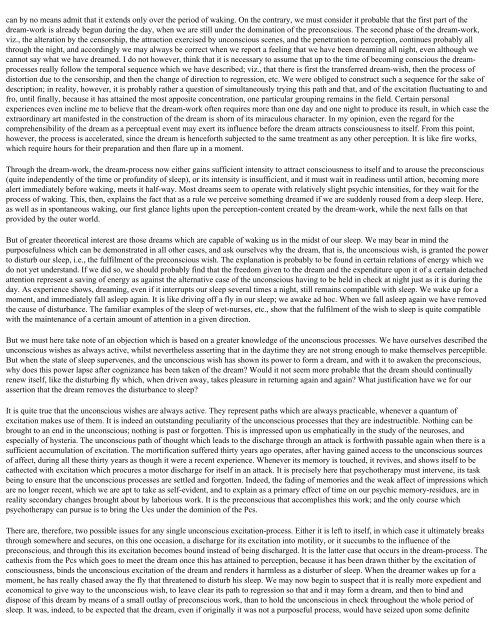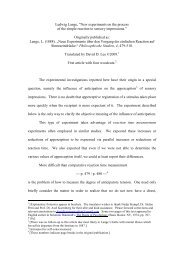The Interpretation Of Dreams Sigmund Freud (1900) PREFACE
The Interpretation Of Dreams Sigmund Freud (1900) PREFACE
The Interpretation Of Dreams Sigmund Freud (1900) PREFACE
Create successful ePaper yourself
Turn your PDF publications into a flip-book with our unique Google optimized e-Paper software.
can by no means admit that it extends only over the period of waking. On the contrary, we must consider it probable that the first part of the<br />
dream-work is already begun during the day, when we are still under the domination of the preconscious. <strong>The</strong> second phase of the dream-work,<br />
viz., the alteration by the censorship, the attraction exercised by unconscious scenes, and the penetration to perception, continues probably all<br />
through the night, and accordingly we may always be correct when we report a feeling that we have been dreaming all night, even although we<br />
cannot say what we have dreamed. I do not however, think that it is necessary to assume that up to the time of becoming conscious the dreamprocesses<br />
really follow the temporal sequence which we have described; viz., that there is first the transferred dream-wish, then the process of<br />
distortion due to the censorship, and then the change of direction to regression, etc. We were obliged to construct such a sequence for the sake of<br />
description; in reality, however, it is probably rather a question of simultaneously trying this path and that, and of the excitation fluctuating to and<br />
fro, until finally, because it has attained the most apposite concentration, one particular grouping remains in the field. Certain personal<br />
experiences even incline me to believe that the dream-work often requires more than one day and one night to produce its result, in which case the<br />
extraordinary art manifested in the construction of the dream is shorn of its miraculous character. In my opinion, even the regard for the<br />
comprehensibility of the dream as a perceptual event may exert its influence before the dream attracts consciousness to itself. From this point,<br />
however, the process is accelerated, since the dream is henceforth subjected to the same treatment as any other perception. It is like fire works,<br />
which require hours for their preparation and then flare up in a moment.<br />
Through the dream-work, the dream-process now either gains sufficient intensity to attract consciousness to itself and to arouse the preconscious<br />
(quite independently of the time or profundity of sleep), or its intensity is insufficient, and it must wait in readiness until attion, becoming more<br />
alert immediately before waking, meets it half-way. Most dreams seem to operate with relatively slight psychic intensities, for they wait for the<br />
process of waking. This, then, explains the fact that as a rule we perceive something dreamed if we are suddenly roused from a deep sleep. Here,<br />
as well as in spontaneous waking, our first glance lights upon the perception-content created by the dream-work, while the next falls on that<br />
provided by the outer world.<br />
But of greater theoretical interest are those dreams which are capable of waking us in the midst of our sleep. We may bear in mind the<br />
purposefulness which can be demonstrated in all other cases, and ask ourselves why the dream, that is, the unconscious wish, is granted the power<br />
to disturb our sleep, i.e., the fulfilment of the preconscious wish. <strong>The</strong> explanation is probably to be found in certain relations of energy which we<br />
do not yet understand. If we did so, we should probably find that the freedom given to the dream and the expenditure upon it of a certain detached<br />
attention represent a saving of energy as against the alternative case of the unconscious having to be held in check at night just as it is during the<br />
day. As experience shows, dreaming, even if it interrupts our sleep several times a night, still remains compatible with sleep. We wake up for a<br />
moment, and immediately fall asleep again. It is like driving off a fly in our sleep; we awake ad hoc. When we fall asleep again we have removed<br />
the cause of disturbance. <strong>The</strong> familiar examples of the sleep of wet-nurses, etc., show that the fulfilment of the wish to sleep is quite compatible<br />
with the maintenance of a certain amount of attention in a given direction.<br />
But we must here take note of an objection which is based on a greater knowledge of the unconscious processes. We have ourselves described the<br />
unconscious wishes as always active, whilst nevertheless asserting that in the daytime they are not strong enough to make themselves perceptible.<br />
But when the state of sleep supervenes, and the unconscious wish has shown its power to form a dream, and with it to awaken the preconscious,<br />
why does this power lapse after cognizance has been taken of the dream? Would it not seem more probable that the dream should continually<br />
renew itself, like the disturbing fly which, when driven away, takes pleasure in returning again and again? What justification have we for our<br />
assertion that the dream removes the disturbance to sleep?<br />
It is quite true that the unconscious wishes are always active. <strong>The</strong>y represent paths which are always practicable, whenever a quantum of<br />
excitation makes use of them. It is indeed an outstanding peculiarity of the unconscious processes that they are indestructible. Nothing can be<br />
brought to an end in the unconscious; nothing is past or forgotten. This is impressed upon us emphatically in the study of the neuroses, and<br />
especially of hysteria. <strong>The</strong> unconscious path of thought which leads to the discharge through an attack is forthwith passable again when there is a<br />
sufficient accumulation of excitation. <strong>The</strong> mortification suffered thirty years ago operates, after having gained access to the unconscious sources<br />
of affect, during all these thirty years as though it were a recent experience. Whenever its memory is touched, it revives, and shows itself to be<br />
cathected with excitation which procures a motor discharge for itself in an attack. It is precisely here that psychotherapy must intervene, its task<br />
being to ensure that the unconscious processes are settled and forgotten. Indeed, the fading of memories and the weak affect of impressions which<br />
are no longer recent, which we are apt to take as self-evident, and to explain as a primary effect of time on our psychic memory-residues, are in<br />
reality secondary changes brought about by laborious work. It is the preconscious that accomplishes this work; and the only course which<br />
psychotherapy can pursue is to bring the Ucs under the dominion of the Pcs.<br />
<strong>The</strong>re are, therefore, two possible issues for any single unconscious excitation-process. Either it is left to itself, in which case it ultimately breaks<br />
through somewhere and secures, on this one occasion, a discharge for its excitation into motility, or it succumbs to the influence of the<br />
preconscious, and through this its excitation becomes bound instead of being discharged. It is the latter case that occurs in the dream-process. <strong>The</strong><br />
cathexis from the Pcs which goes to meet the dream once this has attained to perception, because it has been drawn thither by the excitation of<br />
consciousness, binds the unconscious excitation of the dream and renders it harmless as a disturber of sleep. When the dreamer wakes up for a<br />
moment, he has really chased away the fly that threatened to disturb his sleep. We may now begin to suspect that it is really more expedient and<br />
economical to give way to the unconscious wish, to leave clear its path to regression so that and it may form a dream, and then to bind and<br />
dispose of this dream by means of a small outlay of preconscious work, than to hold the unconscious in check throughout the whole period of<br />
sleep. It was, indeed, to be expected that the dream, even if originally it was not a purposeful process, would have seized upon some definite



